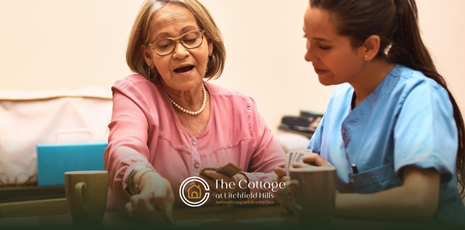Tips for Making the Most of a Respite Stay

Key Highlights
- Respite stays provide short-term senior care for recovery or caregiver relief
- Planning ahead ensures a smooth transition and a more comfortable stay
- Packing familiar items helps create a sense of home and ease anxiety
- Staying active and social enhances well-being during the respite period
- Caregivers also benefit from peace of mind and rest
Caring for a loved one is rewarding, but it can also be emotionally and physically demanding. Whether a caregiver needs a break, has upcoming travel, or simply wants additional support, a respite stay is an excellent solution. A respite stay offers short-term senior care, giving caregivers peace of mind while ensuring that seniors continue receiving the assistance and attention they need.
To truly benefit from this experience, both seniors and their families should prepare in advance. In this guide, we’ll share practical tips for making the most of a respite stay so everyone involved can feel comfortable and supported.
What Is a Respite Stay?
A respite stay is a temporary stay at a senior living community or care facility. These stays can last from just a few days to several weeks. They provide seniors with access to:
- 24/7 professional care for safety and well-being
- Personalized support for daily activities like bathing, dressing, and medication management
- Social opportunities such as group activities, events, and outings
- Nutritious meals tailored to dietary needs
- Rehabilitation support if recovering from surgery, illness, or injury
For caregivers, respite care offers a much-needed break while ensuring their loved one remains in a safe, welcoming environment.
Why Consider a Respite Stay?
Respite care offers a wide range of benefits for seniors and caregivers alike. Here are some key reasons why families choose it:
| Benefit for Seniors | Benefit for Caregivers |
|---|---|
| Professional care and supervision | Peace of mind knowing their loved one is safe |
| Opportunities to socialize and make friends | Time to rest, recharge, or travel |
| Participation in engaging activities | Reduced stress and burnout |
| Access to therapy and rehabilitation services | Ability to focus on personal needs or work commitments |
| Nutritious meals and wellness support | Renewed energy for long-term caregiving |
Tips for Making the Most of a Respite Stay
1. Plan Ahead
Preparation is the key to a smooth transition. If possible, schedule the respite stay in advance rather than waiting for a crisis. Early planning allows families to tour the community, meet staff, and discuss the specific care needs of their loved one.
2. Provide Complete Health Information
Before the stay begins, ensure the care team has detailed medical records, including:
- Current medications and dosage instructions
- Allergies or dietary restrictions
- Past medical history
- Mobility needs
- Emergency contacts
This helps the staff provide safe, personalized care from day one.
3. Pack Comfort Items
While senior living communities are designed for comfort, bringing familiar items can ease the transition. Consider packing:
- Family photos
- A favorite blanket or pillow
- Comfortable clothing and slippers
- Books, puzzles, or hobbies
- Personal care items
Having these familiar objects nearby creates a sense of home.
4. Stay Connected
Even during a short stay, regular communication makes a difference. Families can schedule phone calls, video chats, or in-person visits. For seniors, this reassurance strengthens emotional well-being. For caregivers, it provides updates and peace of mind.
5. Encourage Participation in Activities
Respite stays aren’t just about receiving care—they also offer opportunities for enrichment. Seniors are encouraged to join activities such as:
- Exercise classes
- Arts and crafts
- Movie nights
- Music therapy
- Group outings
These activities foster friendships, reduce feelings of isolation, and keep the mind and body active.
6. Communicate Preferences Clearly
Every senior has unique preferences. Whether it’s bedtime routines, meal choices, or hobbies, sharing these details with the care team helps ensure a comfortable and enjoyable stay.
7. Treat It as a Positive Experience
Instead of viewing respite care as a disruption, think of it as an opportunity for growth and renewal. Seniors gain access to professional care and new experiences, while caregivers return refreshed and better prepared to provide long-term support.
8. Ask Questions and Stay Involved
Don’t hesitate to ask the staff about daily routines, meal planning, therapy options, or activities. Staying informed fosters trust and ensures everyone feels confident about the care provided.
Making Respite Care Easier for Caregivers
Respite care isn’t only about supporting seniors—it also empowers caregivers. To make the most of this time, caregivers should:
- Use the break to rest, focus on health, or catch up on personal responsibilities
- Schedule enjoyable activities, like spending time with friends or pursuing hobbies
- Reflect on long-term care needs and explore future support options
When caregivers return refreshed, they are better equipped to provide patient, loving care.
Overcoming Common Concerns About Respite Care
Many families feel nervous about trying respite care for the first time. Common concerns include:
“Will my loved one feel lonely?”
With professional staff and plenty of social activities, seniors often thrive during respite stays.
“What if the care team doesn’t know my loved one’s routine?”
Detailed preparation and communication ensure staff understand and respect personal preferences.
“Will my loved one resist the stay?"
Framing it as a positive opportunity rather than a burden helps create a smoother adjustment.
Final Thoughts
Respite care is a valuable resource for both seniors and their families. With thoughtful preparation, clear communication, and a positive outlook, seniors can enjoy comfort, social engagement, and professional support during their stay. At the same time, caregivers gain the rest and peace of mind they need to continue providing long-term care.
If you are exploring options for a respite stay, The Cottage at Litchfield Hills offers compassionate, short-term care designed to support seniors and provide caregivers with much-needed relief. Contact us today!
Frequently Asked Questions
How long can a respite stay last?
Respite stays can range from a few days to several weeks, depending on individual and caregiver needs.
What should I pack for a respite stay?
Bring comfortable clothing, personal care items, medications, and familiar objects like photos or blankets to make the stay feel more like home.
Do seniors participate in activities during respite care?
Yes, respite care includes access to community activities, exercise, social events, and wellness programs.
Is respite care covered by insurance?
Coverage varies depending on insurance plans, policies, and medical needs. It’s best to confirm with your provider in advance.
Can respite stays be used as a trial for senior living?
Absolutely. Many families use respite stays to see if a senior living community is the right long-term fit.
Sources:
- https://www.ncoa.org/article/what-is-respite-care-a-guide-for-caregivers/
- https://www.newlifestyles.com/blog/6-tips-for-organizing-medical-records-for-seniors-living-at-home
- https://www.aplaceformom.com/caregiver-resources/articles/memory-care-activities






